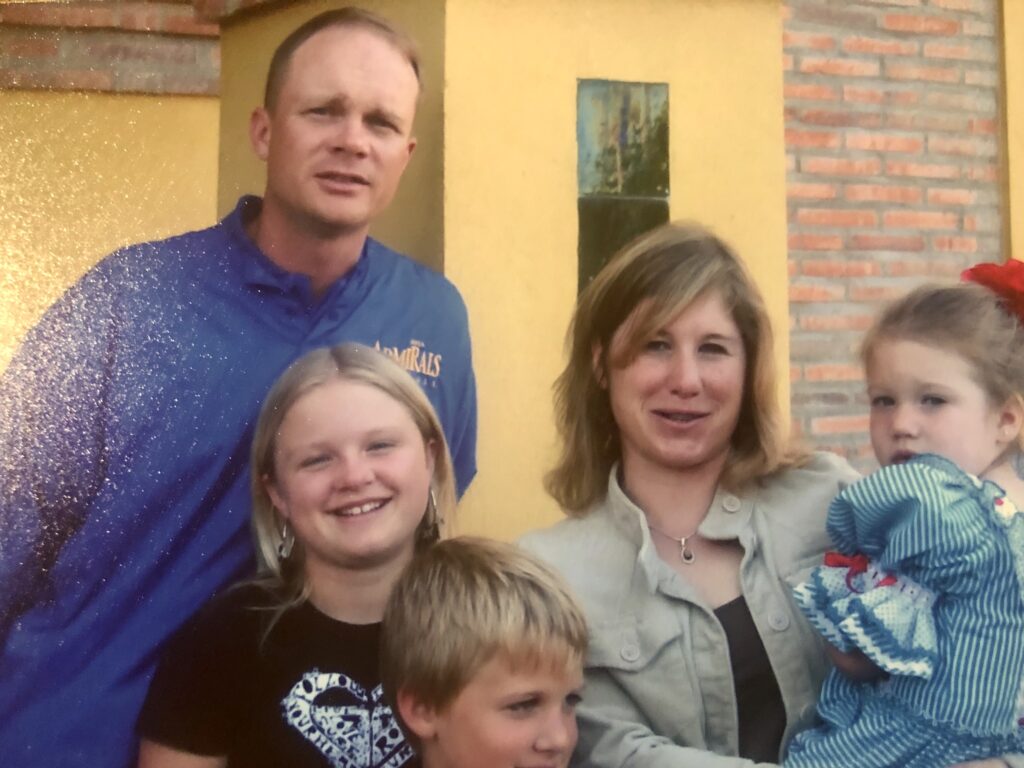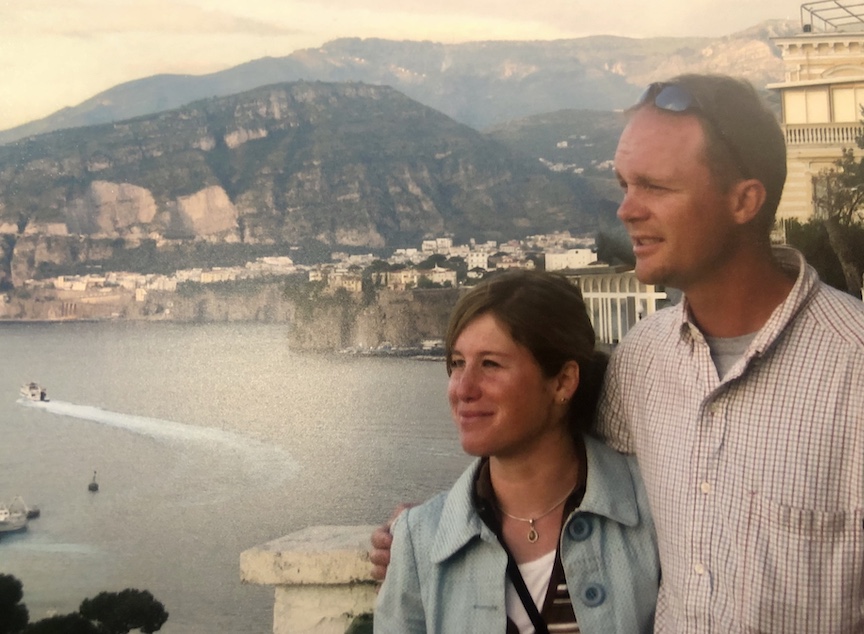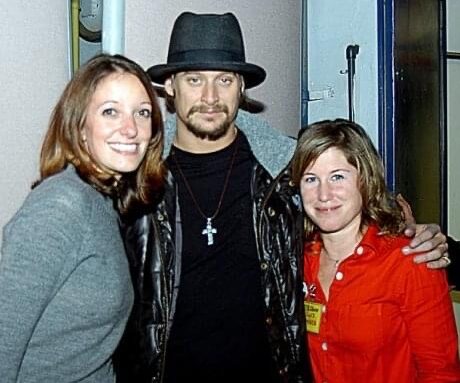Trailing spouses are forced to encounter change more than the average human, often without much support. In my 26 years as a Navy wife, my family has experienced 10 house moves, including five different states and one overseas tour. Throughout this adventure, I’ve continued prioritizing my professional advancement as a creative marketing professional. In the past, pursuing your own career dreams hasn’t been expected of military wives — but times are changing and I hope sharing my story publicly for the first time inspires others to never give up on their dreams.
Continued from Part 2 of Erica’s story….
Three years after our relatively relaxing relocation from Virginia to New Hampshire, I was ready for my family’s biggest adventure yet: Naval Station Rota, Spain.
Or, so I thought.
New Hampshire had been very good to us. We had added a new baby to the family and I had earned my master’s degree in art education and a teaching certificate, which I had hoped would expand my pool of work options whenever and wherever my husband’s military career took us next.
With an overseas assignment, however, the work permits for spouses are limited to whatever’s needed on base. In our case, the base was technically Spanish, not American, which further complicated the situation. Still, I was optimistic that I could find a teaching opportunity or at least daycare job that would be a good fit for a mom with three kids under age 8.
But first, several major disasters hit us at once, testing the Klinger family’s grit.
My second chance at life
A week before our flights, we were staying with my parents in Connecticut to celebrate Christmas and finalize our moving details. Since we couldn’t bring a car to Spain, we had decided to sell my new VW wagon and buy a “beater car” once we go to the base. On the way to getting my car detailed, however, I was hit by a utility van and rammed into a small building. I don’t remember it, but my husband was horrified to see the whole thing while driving behind me.
The emergency responders who cut me out of my vehicle said my side door airbags — still a very new feature in those days — had saved my life, although the impact blinded me for a few hours. Thankfully, I was able to leave the hospital the next day, with my vision and core functions intact, despite my head injury. It wasn’t until a week later that I felt the vertigo, tremendous neck pain and numbness in my arms. I found out later that the accident literally knocked the rocks out of my head!
After seeing my totaled car, I just couldn’t believe I had survived and immediately wrote a letter to VW thanking them for my life. I knew going forward, that car safety would be a higher priority for my family. I felt grateful to be alive, on top of what would have already felt like a life-changing move to Europe.
But wait, there’s more!
We landed in Spain a few days after the accident (U.S. Navy orders aren’t very flexible), and immediately received news that a pipe had burst in our New Hampshire house. Since the house was unoccupied and the damage hadn’t been spotted for a few days, there was significant damage. And to top it off, the situation wasn’t covered by our insurance policy, thanks to some fine print. The resulting out-of-pocket bill of $20,000 was not a great way to start our next deployment.
Then again, we still considered ourselves lucky for the relationships we had built in New Hampshire, including the wonderful real estate agent our friends had recommended. He went above and beyond to manage the repairs and eventual sale of our home. This also gave us another reason to look forward to taking a break from homeownership, as renters in Spain.
Our great adventure
Our relocation to Spain ranked a 7/15 on the Gupte Scale. The car accident had made the timing horrible, but I was still excited about my first move to a foreign country.
And, after these inauspicious beginnings, everything was a great adventure: ordering food, finding a job, traveling, improving our Spanish, and raising our children in a foreign country.

During our first week, I attended a family transition program and met people who worked for Morale, Welfare and Recreation. Similar to the Army USO, MWR provides recreation, travel and entertainment opportunities for active duty members and their families. They mentioned needing help with public relations and their website, and suddenly I found myself back in the marketing business — after having spent two years working towards being an art teacher!
My new job description included planning special holiday events for families, which helped me continue to develop my newer skills in children’s education and ensured I wasn’t in front of a computer 24-7, in contrast to my previous marketing roles. And I still had time for daily rehab sessions to help me recover from my car accident, and to spend evenings and weekends with my kids.
We found a charming rental home off-base with an ocean view that made up for the otherwise tight quarters. (Our son’s tiny room had just 1 foot of space between his twin bed and the wall!) It was amazing to me that even though we had left over half our goods in storage, we still didn’t have room for everyone. European living compared to the United States was very different. I appreciated the priority locals put on experiencing life — eating, traveling — as opposed to owning possessions. It made me recognize how much our family was always working and saving instead of living in the moment, something I vowed to do better at going forward. The expression they used often was “Americans live to work, Spaniards work to live.”

But after a year, we realized that the commute was too inconvenient, our belongings were getting ruined by salt and wind, and our kids needed more space to run and play. We moved closer to the base, in a neighborhood filled with American and Spanish families – featuring a salt-water pool and playground right outside our front door! Our kids were on the road to becoming bilingual social butterflies. We were learning to slow down and appreciate the opportunity to explore a new culture. Some Navy families did not leave the base often and we were focused on seeing Europe and showing our kids the world while we had this opportunity (and it was affordable).
Almost famous
In the meantime, my job was making good use of my web design and development skills and helping me develop new ones in public affairs, strategic alliances and event marketing. Thanks to my tech background, I was able to innovate and digitize processes that had previously been inefficiently done on paper; the transformation was appreciated by our executive management team and rolled out to other military bases across Europe. This gave me the confidence to explore avenues within marketing and not feel the need to follow an art education path… just yet.

I also became a local celebrity through my team’s weekly TV and radio show for the base, and interviewed real celebrities like Kid Rock, Lance Armstrong and Robin Williams. I really pushed myself out of my comfort zone and was more confident in building business and strategic relationships.
After seven years of marriage, with my husband deployed most of the time, we were now living and working together. This gave me a deeper understanding of how the Navy worked, and the knowledge to support my husband for the rest of his career.
My physical therapy breakthroughs enabled us to take our kids canyon descending, on large hikes and even driving a 12-pack van to ski trips in Granada. We made close friends with other American families and their children and traveled together on ski trips to Germany and house rentals touring Spanish cities like Madrid and Barcelona and other countries like Italy, Morocco and Portugal.
I also joined an outdoor club made up of local members, organized by high school teachers. We went on overnight hiking and biking trips; I even hiked the highest peak in Spain. It was liberating — this was the first time I felt OK being away from my three kids for short periods — and further reinforced my love for the outdoors.
Personal and professional growth
Only now, more than a decade later, as I reflect on my 3.5 years as an expat wife on top of my adulthood as a military dependent and trailing spouse, do I fully appreciate the tremendous obstacles I overcame through this experience.
Finding people with similar interests and realizing the value of a work-life balance and connection to nature changed my outlook on what mattered to me in a career. It wasn’t about the title, the company I worked for, the income or using my degree, it was about helping people and making a difference in the community I lived in — and ensuring a better future for my kids.
I had a new vision and by taking some risks and making strategic choices, I stayed focused on this dream and did end up meeting those goals.
Our next stop was Millington, about 30 minutes outside of Memphis, Tennessee. This seems like a promising duty station for us. The low cost-of-living favored a family with three growing kids, and the administrative work both checked the box for a career requirement and would keep my husband safe and home for the few years. And as for my career? Thanks to my work with the MWR in Spain, I had more options than ever.
Still, this move was only a 6/15 on the Gupte Scale. We felt sad to leave our friends for an unfamiliar place, and we knew suburban American life wouldn’t be as exciting as living in Spain — but we tried to keep a positive outlook!
Continue reading the fourth installment of Erica’s story, including navigating career moves, cultural differences and changing family dynamics.

